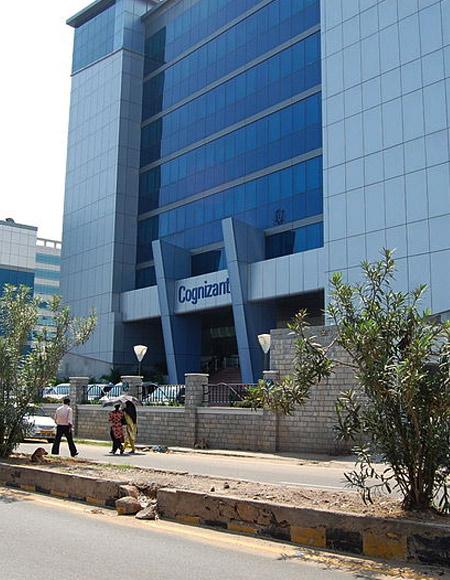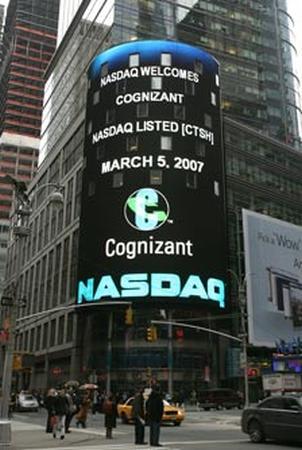Photographs: Ganeshk/Wikimedia Commons Bibhu Ranjan Mishra in Bengaluru
The proposed comprehensive immigration reforms Bill in the US would affect all major offshore-centric information services services companies.
But it is expected Nasdaq-listed Cognizant would be hit the hardest, considering the company's low margin bandwidth high exposure to the US market.
According to a recent report by global equity analyst firm JP Morgan, Cognizant's earning per share -- used to gauge a company's profitability -- could be hit by as much as 25 per cent, after the reforms are implemented.
. . .
Tough immigration rules in US may hit Cognizant hardest
This is primarily because the company operates on a thin operating margin and its exposure to the US is higher, compared to the rest of the pack.
The JP Morgan report is based on a presentation TCS, Cognizant, Infosys and Wipro made at its annual global technology, media and telecom conference in Boston last month.
"Cognizant may be the most vulnerable to the Bill, as its (estimated) CY14 EPS has been hit as much as 25 per cent . . . Cognizant is the most vulnerable, primarily because of its lower margins and its higher percentage of revenues from the US," the report said.
. . .
Tough immigration rules in US may hit Cognizant hardest
Photographs: Michael Buholzer/Reuters
"In any case, we see FY15/CY14 EPS of all the four firms being impacted by double-digit percentages," it added.
The Bill, mooted by bipartisan senators, known as the 'gang of eight', cleared its first major hurdle on Tuesday, with the Senate clearing it for a debate.
The Senate offered about 100 amendments to the original legislation.
Historically, Cognizant's operating margin has been 19-20 per cent, something the company considers a necessity to stay healthy by investing profits back into the business.
For the quarter ended March, the company's operating margin stood at 19.9 per cent.
The image is for representational purpose only
. . .
Tough immigration rules in US may hit Cognizant hardest
Photographs: Keith Bedford/Reuters
The company's exposure to the US is the highest compared to its peers, with close to 80 per cent of its revenues coming from there.
TCS, India's second-largest IT services company, might be hit the second-hardest, with its EPS expected to be impacted by about 18 per cent, followed by Infosys (15 per cent).
Wipro and HCL Technologies were relatively better placed, the report said.
It added most companies expected the Senate's version of the Bill to go through essentially unchanged, though they remained optimistic the House's version would be less onerous.
. . .
Tough immigration rules in US may hit Cognizant hardest
Photographs: Reuters
However, companies feel the 'outplacement' clause in the Bill is likely to be intensely negotiated with stakeholders, including lawmakers.
The clause debars sending H-1B sponsored employees of H-1B-dependent firms (those with more than 15 per cent of US employees as H-1B ones) to client sites in the US.
This affected the business model of the IT services industry and could be partly offset through greater localisation and near-shore centres, which were added costs for these companies, it said.
. . .
Tough immigration rules in US may hit Cognizant hardest
Image: Cognizant logo on display on the NASDAQ headquarters in Times Square.Photographs: Courtesy, The Nasdaq Stock Market Inc
"We continue to think the net impact of the immigration Bill is a net negative for the offshore IT services industry.
"It seems that at the least, the net impact would be higher costs (increased visa costs and realignment of non-immigrant visa wages), which is something various players have reconciled with and are agreeable to," the report said.
Rahul Kanodia, vice-chairman and chief executive of Datamatics Global Services, a Mumbai-based IT services company, said since the 'outplacement' clause wouldn't allow vendors to send their employees to client premises, they would be forced to hire locally.
. . .
Tough immigration rules in US may hit Cognizant hardest
Photographs: Reuters
But since most client engagements are short-term, local employees could demand a high premium.
Besides, after the end of the project, if the company wants to terminate employment, it would have to pay a hefty severance package.
"There is no doubt it would have a severe impact on all offshore IT services companies. There will be an impact on capital expenditure and people movement.
"These kinds of provisions put a tremendous amount of churn and strain on the whole system and the way the whole offshore IT services model works," Kanodia said.








article